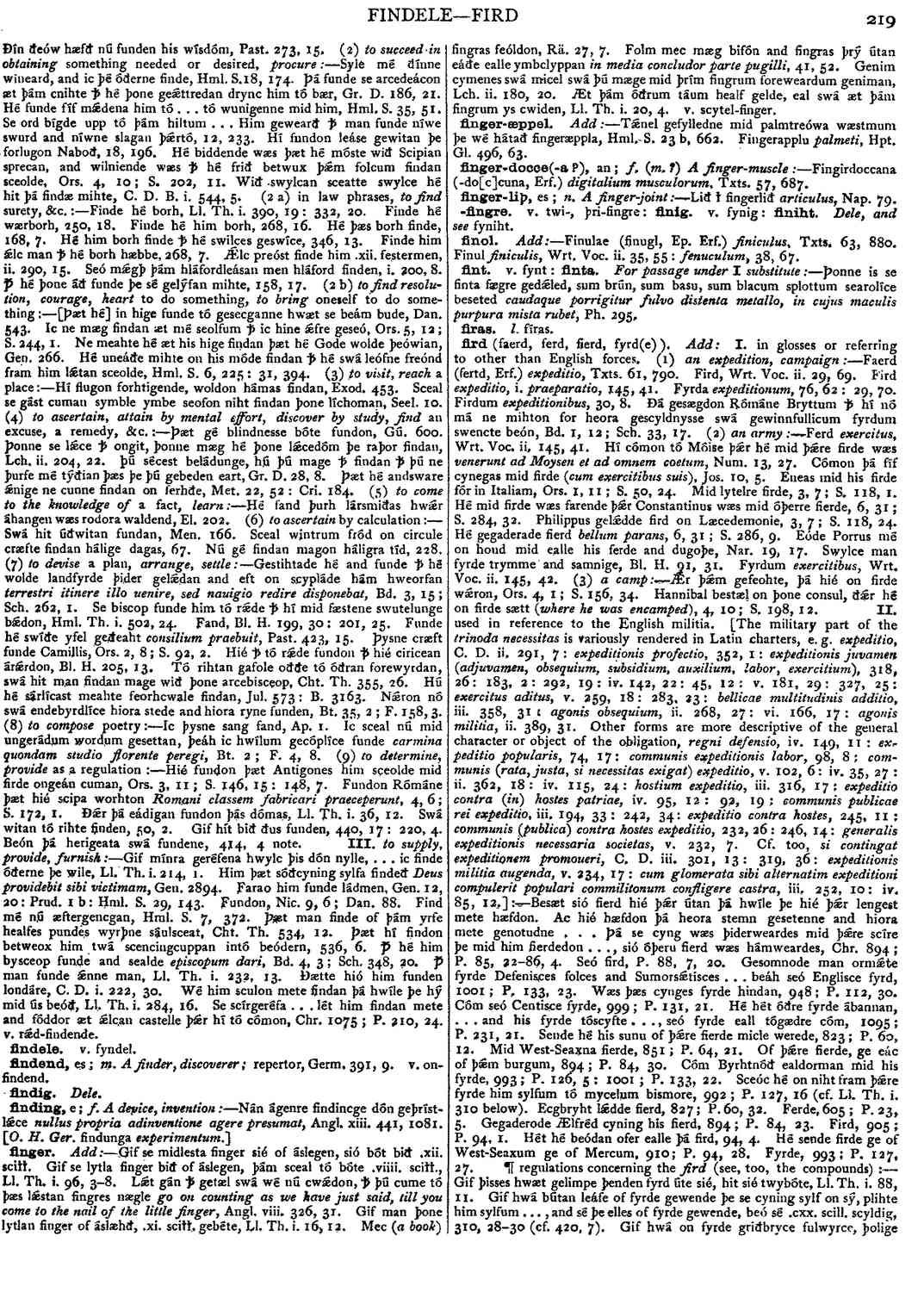fird
- noun [ feminine ]
-
Faerd (fertd, Erf. )
expeditio,
- Txts. 61, 790 .
-
Fird,
- Wrt. Voc. ii. 29, 69 .
-
Fird
expeditio, i. praeparatio,
- 145, 41 .
-
Fyrda
expeditionum,
- 76, 62 :
- 29, 70 .
-
Firdum
expeditionibus,
- 30, 8 .
-
Ðá gesægdon Rómáne Bryttum ꝥ hí nó má ne mihton for heora gescyldnysse swá gewinnfullicum fyrdum swencte beón,
- Bd. I. 12 ;
- Sch. 33, 17 .
-
Ferd
exercitus,
- Wrt. Voc. ii. 145, 41 .
-
Hi cómon tó Móise þǽr hé mid þǽre firde wæs
venerunt ad Moysen et ad omnem coetum,
- Num. 13, 27 .
-
Cómon þá fíf cynegas mid firde
(cum exercitibus suis).
- Jos. 10, 5 .
-
Eneas mid his firde fór in Italiam,
- Ors. ii ;
- S. 50, 24 .
-
Mid lytelre firde,
- 3, 7 ;
- S. 118,
-
Hé mid firde wæs farende þǽr Constantinus wæs mid óþerre fierde,
- 6, 31 ;
- S. 284, 32.
-
Philippus gelǽdde fird on Læcedemonie,
- 3, 7 ;
- S. 118, 24 .
-
Hé gegaderade fierd
bellum parans,
- 6, 31 ;
- S. 286, 9 .
-
Eóde Porrus mé on houd mid ealle his ferde and dugoþe,
- Nar. 19, 17 .
-
Swylce man fyrde trymme and samnige,
- Bl. H. 01, 31 .
-
Fyrdum
exercitibus,
- Wrt. Voc. ii. 145, 42 .
-
Ær þǽm gefeohte, þá hié on firde wǽron,
- Ors. 4, l ;
- S. 156, 34 .
-
Hannibal bestæl on þone consul, ðǽr hó on firde sætt
(where he was encamped),
- 4, 10 ;
- S. 198, 12 .
-
Besæt sió fierd hié þǽr útan þí hwíle þe hié þǽr lengest mete hæfdon. Ac hié hæfdon þá heora stemn gesetenne and hiora mete genotudne . . . fÞá se cyng wæs þiderweardes mid þǽre scíre þe mid him fierdedon . . . , sió óþeru fierd wæs hámweardes,
- Chr. 894 ;
- P. 85, 22-86, 4 .
-
Seó fird,
- P. 88, 7, 20 .
-
Gesomnode man ormǽte fyrde Defenisces folces and Sumorsǽtisces . . . beáh seó Englisce fyrd, looi;
- P. 133, 23.
-
Wæs þæs cynges fyrde hindan,
- 948 ;
- P. 112, 30 .
-
Cóm seó Centisce fyrde,
- 999 ;
- P. 131, 21.
-
Hé hét óðre fyrde ábannan, . . . and his fyrde tóscyfte . . . , seó fyrde eall tógædre cóm,
- 1095 ;
- P. 231, 21 .
-
Sende hé his sunu of þǽre fierde micle werede,
- 823 ;
- P. 60, 12 .
-
Mid West-Seaxna fierde,
- 851 ;
- P. 64, 21 .
-
Of þǽre fierde, ge eác of þǽm burgum,
- 894 ;
- P. 84, 30 .
-
Cóm Byrhtnðð ealdorman mid his fyrde,
- 993 ;
- P. 126, 5 :
- 1001 ;
- P. 133, 22 .
-
Sceóc hé on niht fram þǽre fyrde him sylfum tó mycelum bismore,
- 992 ;
- P. 127, 16 (cf.
- Ll. Th. i. 310 below ).
-
Ecgbryht lǽdde fierd,
- 827 ;
- P. 60, 32 .
-
Ferde,
- 605 ;
- P. 23, 5 .
-
Gegaderode Ælfréd cyning his fierd,
- 894 ;
- P. 84, 23 .
-
Fird,
- 905 ;
- P. 94, I.
-
Hét hé beódan ofer ealle þá fird,
- 94, 4.
-
Hé sende firde ge of West-Seaxum ge of Mercum,
- 910 ;
- P. 94, 28 .
-
Fyrde,
- 993 ;
- P. 127, 27 .
-
regulations concerning the fird (see, too, the compounds):
Gif þisses hwæt gelimpe þenden fyrd úte sié, hit sié twybóte,
- Ll. Th. i. 88, ii.
-
Gif hwá bútan leáfe of fyrde gewende þe se cyning sylf on sý, plihte him sylfum . . . , and sé þe elles of fyrde gewende, beo sé, cxx. scill. scyldig,
- 310, 28-30 (cf. 420, 7).
-
Gif hwá on fyrde griðbryce fulwyrce, þolige lifes,
- 408, 22.
-
¶ an instance of a person receiving and responding to a summons to the
fird is given in the following:
Gelamp emb þá tíd þæt man beónn ealle Cantware tó wígge tó Holme, pá nolde Sigelm tó wígge faran mid nánes mannes scette unágefnum. . . Hé on wígge áfeallen wæs,
- Ch. Th. 201, 19-28.
-
¶ a case of assessment for the fird, that of Abingdon, is given in the following:
Expeditionem cum xii. uassallis et cum tantis scutis exerceaut,
- C. D. i. 272, 2.
Bosworth, Joseph. “fird.” In An Anglo-Saxon Dictionary Online, edited by Thomas Northcote Toller, Christ Sean, and Ondřej Tichy. Prague: Faculty of Arts, Charles University, 2014. https://bosworthtoller.com/44997.
Checked: 1